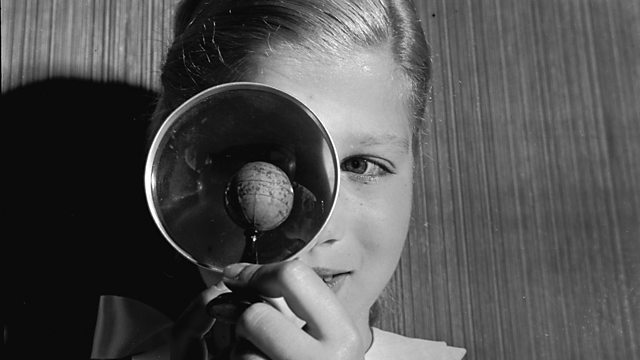Curiosity
What is the proper place for curiosity in the 21st century? And is it always a good thing?
Curiosity has always been with us but it's not always easy to say what is the optimum amount in any given situation. Have the cosmologists lost sight of it in a dogmatic theory of the universe? Are there lessons in the scientific spirit of the 17th century? And when it comes to human beings and curiosity, does curiosity carry dangers for young people in changing societies? Joining Carrie Gracie are theoretical physicist Lee Smolin, science historian Philip Ball and social scientist Masooda Bano.
(Image: Young girl peering into a 3D object. Credit: Al Barry/Three Lions/Getty Images)
Last on
More episodes
Previous
Next
Chapters
-
Philip Ball
Duration: 13:21
Masooda Bano
Duration: 09:39
60 second idea: Make mending an art form
Duration: 04:04
Lee Smolin
Duration: 13:26
Philip Ball
![Philip Ball]()
Philip Ball is a regular contributor to Nature, New Scientist, New York Times, Guardian, Financial Times and the author of several popular books on science, including works on the nature of water, pattern formation in the natural world, colour in art, and the science of social and political philosophy. He has written widely on the interactions between art and science, and has delivered lectures to scientific and general audiences at venues ranging from the NASA Ames Research Center and the London School of Economics. His latest book is in which he argues that re-evaluation of curiosity was a key element in the Scientific Revolution of the 17th century, the starting-point for so much in today鈥檚 world.
Masooda Bano
![Masooda Bano]()
Dr. Masooda Bano from聽Department of International Studies at Oxford University studies the role of ideas and beliefs in development processes and their evolution and change, especially the emergence and growth of female Islamic education movements across the Muslim world since the 1970s. This project draws on extensive fieldwork in Pakistan, Nigeria and Syria. She says that, compared with their parents, the curiosity of today鈥檚 young generation, even in rural areas of the developing world, is more global, fuelled by easy access to satellite TV and聽internet. But while this聽is聽making some聽aspire high and migrate to new contexts, for many others it simply leads to disgruntlement with聽what they don't have.
Lee Smolin
![Lee Smolin]()
Lee Smolin is a theoretical physicist who, since 2001, has been a founding and senior faculty member at the Perimeter Institute for Theoretical Physics. His main contributions have been so far to the quantum theory of gravity: loop quantum gravity and deformed special relativity. He has written four books which explore philosophical issues raised by contemporary physics and cosmology: The聽Life of the Cosmos, Three Roads to Quantum Gravity, The Trouble with Physics and . He suggests that rather than being unchanging and timeless, fundamental laws of physics might actually be evolving, in process similar to natural selection.
60 second idea
Philip Ball says that we should make mending an art form. Not necessarily putting it in galleries, although he has no objection to that, but encouraging and celebrating the skills of mending in everyday life. We can all learn from the ancient art of mending broken ceramics in Japan, where the mend is seen as an opportunity to make the broken object even more beautiful, in some cases by picking out the network of glue with gold powder. It鈥檚 part of the Japanese idea of wabi-sabi, which accepts impermanence. To make this happen, we鈥檇 need to make mending easier, for example so that clothes are sold with spare material or wool for patching and darning, and designers of electronics and cars are forced to stop making items hermetically sealed. Most importantly, we need to remove the stigma of repair, so that mended clothes aren鈥檛 seen as scruffy but as elegant, as acceptable in the boardroom as in the workshop.
Comments on the programme
We are eternally curious. It is our greatest asset. If we weren't, we'd still be living in caves and hunting down our food with primitive tools. Science is nothing if not our pure fascination with Nature / the Universe and our eternal curiosity about how it works. Thank goodness for it.
Shirin Reif
Curiosity has prevented censorship from gaining the upper hand. We are naturally curious animals and therefore want to know what is being kept from us and why. Very important in authoritarian societies where governments control the flow and means of communications.
Gary Rawnsley
Brilliant idea!! Here in Ghana people repair everything and anything! Almost nothing is discarded! In just this last week someone was very excited to receive a broken fridge that I had given up on and left sitting in my garden for 2 years - within a day they had it working again and were using it to sell chilled water.
Jessica Osborn
In Next Week鈥檚 Programme
Fragility: how close are we to a detailed understanding of why materials, relationships and ecosystems fracture? With novelist Barbara Kingsolver, bumblebee expert David Goulson and nano-engineer Markus Buehler.
Broadcasts
- Sat 1 Jun 2013 23:06GMT大象传媒 World Service Online
- Sun 2 Jun 2013 10:06GMT大象传媒 World Service Online
- Mon 3 Jun 2013 02:06GMT大象传媒 World Service Online
What is the role of libraries in the digital age?
Podcast
-
![]()
The Forum
The programme that explains the present by exploring the past






